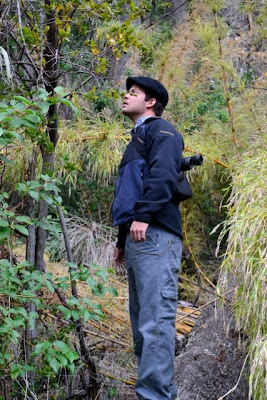Sanders awarded grant for effect of climate change on ants
Ecology Observatory in Oak Ridge
The Knoxville News-Sentinel newspaper recently covered the establishment of a UT/ORNL site as one of 20 ecological observatories funded as part of a new $434M national program. Members of EEB will be heavily involved in this research.
Grant to Matheny for new Fungi of Australia volume
Brandon Matheny and Neale Bougher (Department of Conservation, Western Australia) have received a grant from the Australian Biological Resources Study, in conjunction with matching funds from the Western Australia Naturalists’ Club, Inc., to add a systematic volume to the Fungi of Australia series. The subject of the volume will be the Inocybaceae of Australia, a family of ectomycorrhizal fungi particularly diverse in temperate regions of Australia.
Bat grant to Jennifer Krauel

Jennifer Krauel, a PhD student of Gary McCracken, recently got an award from Bat Conservation International for studying “Fall migration of Tadarida brasiliensis and their agricultural insect prey”.
Mariano Rodriguez-Cabal awarded NSF DDIG fellowship for work on invasion ecology in Patagonia
EEB grad student Mariano Rodriguez-Cabal was just awarded an NSF DDIG fellowship for his PhD work on invasion ecology in Patagonia:
DISSERTATION RESEARCH: Direct and indirect effects of invasive species on plant-seed disperser mutualisms.
Many plants rely on fruit-eating animals to disperse their seeds. This interaction benefits both the plant and the animal and is therefore termed a mutualism. Because seed dispersal can determine the abundance and range of the plant, seed dispersal mutualisms can benefit other species that use the plant for food or shelter and thus affect patterns of biodiversity across the landscape. The introduction by humans of new species into a habitat can disrupt seed dispersal mutualisms, but we know little about such disruptions may affect other, interrelated species. This project will test the larger ecological effects of disruption of an important seed dispersal mutualism in the northern temperate forests of Patagonia in Argentina. The mistletoe Tristerix corymbosus is the sole winter nectar source for the hummingbird Sephanoides sephaniodes, which remains in the region year-round and is in turn responsible for the pollination of nearly 20% of the endemic woody flora in the region. The seeds of the mistletoe are dispersed exclusively by the marsupial Dromiciops gliroides. After passing through the gut of the marsupial, most of the defecated seeds stick to branches of maqui, Aristotelia chilensis, the most abundant understory shrub in the forest and the most common host for the mistletoe. Because of these close ecological relationships, exotic species that reduce the density of maqui could also reduce the abundances of the mistletoe, the hummingbird, and the marsupial, changing the forest as a whole. This project will test the effects of the exotic wasp Vespula germanica and of exotic ungulates on maqui populations and on the linked species in the forest.
Conservation of biological diversity is important to human society, and one of the major threats to biodiversity are the accidental and intentional introductions of new species around the world by humans. This research will further our understanding of how introduced species can affect biodiversity and help guide management to conserve diversity. The research will also strengthen international scientific collaboration and training.
Mariano Rodriguez-Cabal awarded NSF DDIG fellowship for work on invasion ecology in Patagonia
EEB grad student Mariano Rodriguez-Cabal was just awarded an NSF DDIG fellowship for his PhD work on invasion ecology in Patagonia:
DISSERTATION RESEARCH: Direct and indirect effects of invasive species on plant-seed disperser mutualisms.
Many plants rely on fruit-eating animals to disperse their seeds. This interaction benefits both the plant and the animal and is therefore termed a mutualism. Because seed dispersal can determine the abundance and range of the plant, seed dispersal mutualisms can benefit other species that use the plant for food or shelter and thus affect patterns of biodiversity across the landscape. The introduction by humans of new species into a habitat can disrupt seed dispersal mutualisms, but we know little about such disruptions may affect other, interrelated species. This project will test the larger ecological effects of disruption of an important seed dispersal mutualism in the northern temperate forests of Patagonia in Argentina. The mistletoe Tristerix corymbosus is the sole winter nectar source for the hummingbird Sephanoides sephaniodes, which remains in the region year-round and is in turn responsible for the pollination of nearly 20% of the endemic woody flora in the region. The seeds of the mistletoe are dispersed exclusively by the marsupial Dromiciops gliroides. After passing through the gut of the marsupial, most of the defecated seeds stick to branches of maqui, Aristotelia chilensis, the most abundant understory shrub in the forest and the most common host for the mistletoe. Because of these close ecological relationships, exotic species that reduce the density of maqui could also reduce the abundances of the mistletoe, the hummingbird, and the marsupial, changing the forest as a whole. This project will test the effects of the exotic wasp Vespula germanica and of exotic ungulates on maqui populations and on the linked species in the forest.
Conservation of biological diversity is important to human society, and one of the major threats to biodiversity are the accidental and intentional introductions of new species around the world by humans. This research will further our understanding of how introduced species can affect biodiversity and help guide management to conserve diversity. The research will also strengthen international scientific collaboration and training.
REU supplement to Matheny grant
Brandon Matheny has gotten a Research Experiences for Undergraduates (REU) grant from the NSF for his existing grant for a revision of Australian species of Inocybaceae. Quoting from the NSF REU site, “The Research Experiences for Undergraduates (REU) program supports active research participation by undergraduate students in any of the areas of research funded by the National Science Foundation. REU projects involve students in meaningful ways in ongoing research programs or in research projects specifically designed for the REU program.”
